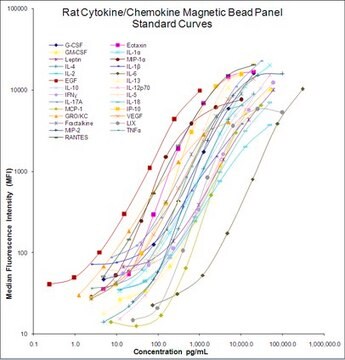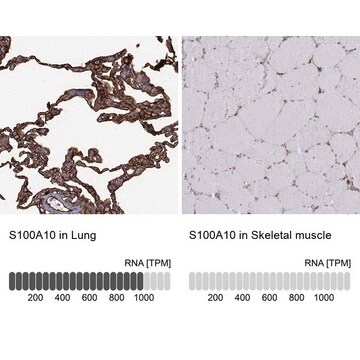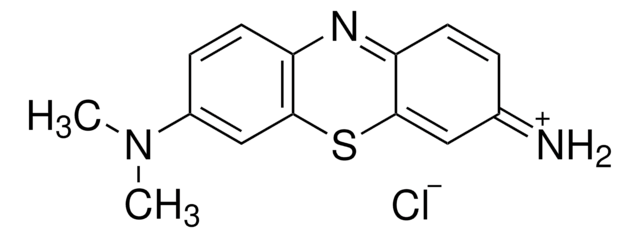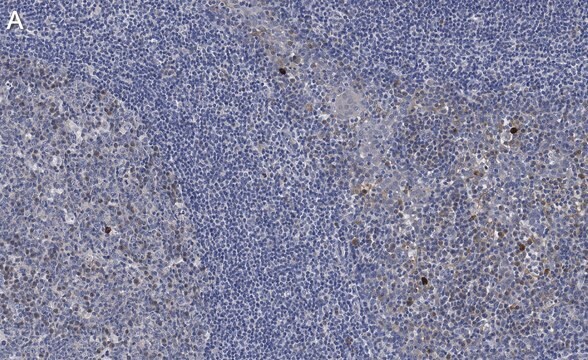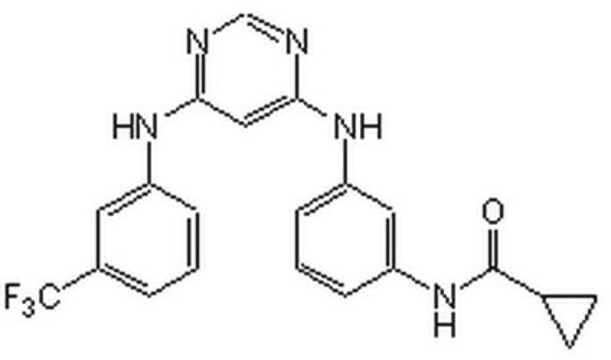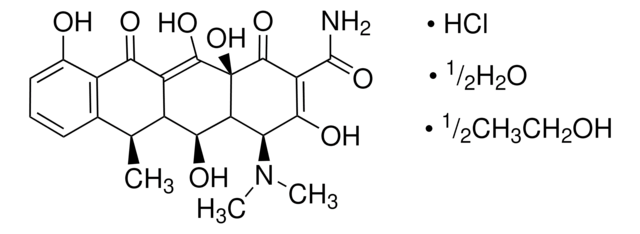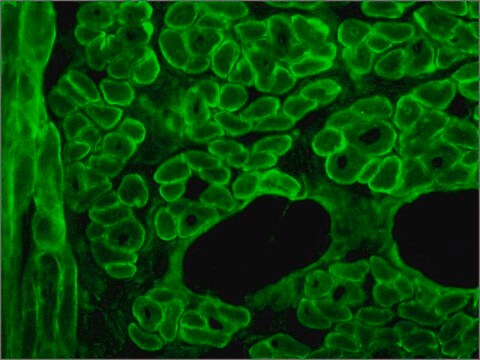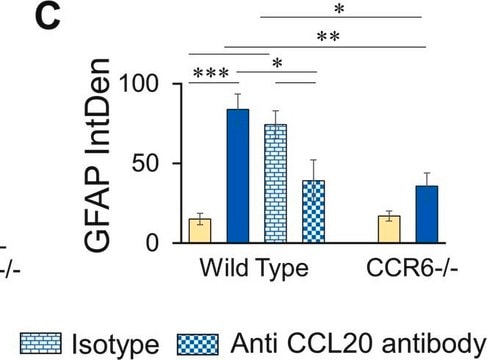RAB0364
Human MMP-13 ELISA Kit
for serum, plasma, cell culture supernatant and urine
Sign Into View Organizational & Contract Pricing
All Photos(2)
About This Item
UNSPSC Code:
41116158
NACRES:
NA.32
Recommended Products
species reactivity
human
packaging
kit of 96 wells (12 strips x 8 wells)
technique(s)
ELISA: suitable
capture ELISA: suitable
input
sample type cell culture supernatant(s)
sample type urine
sample type plasma
sample type serum
assay range
inter-assay cv: <12%
intra-assay cv: <10%
sensitivity: 6 pg/mL
standard curve range: 8.23-6000 pg/mL
detection method
colorimetric
shipped in
wet ice
storage temp.
−20°C
Gene Information
human ... MMP13(4322)
General description
The Human MMP-13 ELISA (Enzyme-Linked Immunosorbent Assay) kit is an in vitro enzyme-linked immunosorbent assay for the quantitative measurement of human MMP-13 in serum, plasma, cell culture supernatants and urine.
Immunogen
Recombinant Human MMP13
Application
For research use only. Not for use in diagnostic procedures.
Please refer to the attached General ELISA KIT Procedure (sandwich, competitive & Indirect ELISA)
Please refer to the attached General ELISA KIT Procedure (sandwich, competitive & Indirect ELISA)
Biochem/physiol Actions
MMP13 (matrix metalloproteinase 13) functions against different types of ECM (extracellular matrix) components. It gets activated by and activates multiple MMPs and hence, has a central role in the MMP cascade. This protein is frequently expressed in colorectal cancer (CRC) and this expression is linked with poor survival in CRC. MMP13 expression is absent in normal breast tissue, but is present in breast carcinoma suggesting its role in tumorigenesis. The expression of this protein can serve as a marker for tumor invasiveness, as its expression is induced during metastasis of multiple types of cancers, including squamous cell carcinomas of the head and neck and this expression is usually linked to poor prognosis. Missense mutation in this gene results in the autosomal dominant disorder called Missouri type of human spondyloepimetaphyseal dysplasia (SEMDMO), which is characterized by abnormal growth and modeling of vertebrae and long bones.
Other Notes
A sample Certificate of Analysis is available for this product.
Please type the word sample in the text box provided for lot number.
Please type the word sample in the text box provided for lot number.
Signal Word
Warning
Hazard Statements
Precautionary Statements
Hazard Classifications
Met. Corr. 1
Storage Class Code
8B - Non-combustible corrosive hazardous materials
Flash Point(F)
Not applicable
Flash Point(C)
Not applicable
Choose from one of the most recent versions:
Already Own This Product?
Find documentation for the products that you have recently purchased in the Document Library.
Mesfin Yimam et al.
Nutrients, 11(2) (2019-01-30)
Osteoarthritis (OA) is characterized by progressive articular cartilage degradation. Although there have been significant advances in OA management, to date, there are no effective treatment options to modify progression of the disease. We believe these unmet needs could be bridged
X-L Shui et al.
European review for medical and pharmacological sciences, 21(10), 2329-2337 (2017-06-16)
Rheumatoid arthritis (RA) is one systemic auto-immune disorder featured as chronic synovitis and can destruct joint cartilage. Fibroblast-like synoviocyte (FLS) secretes various factors affecting chondrocyte matrix and degradation. This study thus investigated the effect of interleukin-17A (IL-17A) on FLS and
S-S Lin et al.
Osteoarthritis and cartilage, 27(9), 1372-1381 (2019-05-31)
MicroRNA (miRNA)107 expression is downregulated but high mobility group box 1 (HMGB-1), Toll-like receptors (TLRs), and receptor for advanced glycation end products (RAGE) are upregulated in osteoarthritic (OA) cartilage. We investigated mir-107/HMGB-1 signaling in OA after hyperbaric oxygen (HBO) treatment.
Wojciech Szczęsny et al.
Journal of Zhejiang University. Science. B, 19(1), 65-70 (2018-01-09)
Metalloproteinases are a key component of the pathogenesis of abdominal hernias. Obesity is considered a risk factor in herniogenesis and hernia recurrence. The aim of this study was to evaluate the serum concentrations of metalloproteinase-2 (MMP-2), MMP-9, MMP-13, and adiponectin
MMP13 mutation causes spondyloepimetaphyseal dysplasia, Missouri type (SEMD(MO).
Kennedy AM
The Journal of Clinical Investigation null
Our team of scientists has experience in all areas of research including Life Science, Material Science, Chemical Synthesis, Chromatography, Analytical and many others.
Contact Technical Service![10-O-[(2R,3S)-3-(Benzoylamino)-2-hydroxy-3-phenylpropanoyl]-10-O-deacetylpaclitaxel certified reference material, TraceCERT®, Manufactured by: Sigma-Aldrich Production GmbH, Switzerland](/deepweb/assets/sigmaaldrich/product/images/664/284/58706ab2-a34b-45f2-9e0e-c9c3bd1f8d78/640/58706ab2-a34b-45f2-9e0e-c9c3bd1f8d78.jpg)
